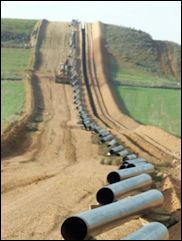The battle over the Atlantic Coast Pipeline is intensifying. Foes of the project, residing mainly in picturesque Augusta and Nelson counties, have raised about $500,000, halfway to a $1 million goal, to rouse opposition to the planned 550-mile natural gas pipeline, reports the McClatchy News Service.
The “All Pain No Gain” group has set up a website with splashy graphics, videos, a blog — even an original country & western-style song. The website provides sympathetic profiles of affected landowners and advances economic and environmental arguments against the pipeline. It’s an impressive showing for “rural” Virginia, but perhaps not so surprising given the popularity of the area as a resort or retirement destination, especially around the Wintergreen resort, among high-powered professionals.
Backers include Phil Anderson, president of the Washington, D.C., lobbying firm Navigators Global, whose family has long owned a farm in the area, and Tom Harvey, a former national security official whose nonprofit group works with corporations on global environmental initiatives. Co-chair Charlotte Rea is a retired Air Force Colonel with considerable management experience, while co-chair Nancy Sorrells served two terms on the Augusta County board of supervisors.
The website raises a number of substantive issues:
- Loss of property values. Construction of the pipeline would require cutting a 125-foot swath (the width of an Interstate highway) along the length of the pipeline. Trees cannot be planted within the easement, which means even a grassed-over pipeline route would be highly visible. Although landowners are compensated for land taken, they receive no loss for the damage to their viewshed. Dominion, the managing partner of the Atlantic Coast Pipeline, encountered similar objections when it proposed building a high-voltage transmission line through Virginia’s northern Piedmont several years ago. There are legitimate questions as to whether Virginia’s eminent domain law provides landowners adequate compensation for lost value. It’s a legal and philosophical question worth exploring.
- Safety. By comparison to other transportation modes, pipelines are a safe way to transport natural gas, but they are not risk free. The website cites four gas pipeline accidents across the country since 2005, including a 2008 incident in which a Williams Transco pipeline exploded in Appomattox, Va., destroying two homes and injuring five people. That pipeline was fined $1 million for failing to address the dangerous corrosion that caused the accident. Could such an incident occur with the Atlantic Coast Pipeline, or have regulations, technology and/or business practices rendered it unlikely?
- Water contamination. Blasting from pipeline construction could contaminate water quality, while excavation around streams, wetlands and riparian groundwater could disturb groundwater flow and damage springs. Moreover, asserts All Pain No Gain, Dominion pipeline construction in West Virginia in 2012 caused sediment pollution to several adjacent waterways. What’s not clear from the website is how lasting and significant any damage would be, or the likelihood of it occurring at all.
- Impact on local craft agriculture. Craft agriculture is becoming a pillar of the Shenandoah Valley economy, with companies like Blue Mountain Brewery and Miller’s Bake Shop supporting local jobs. “Any contamination to the local water supply as a result of the Atlantic Coast Pipeline could cripple a business that is quickly becoming an institution in the Shenandoah Valley,” asserts the website. How realistic is that fear? Have other pipeline construction projects contaminated water supplies severely enough to impact jobs?
- Future of energy prices. All Pain No Gain disputes Dominion’s argument that the pipeline will mean lower electric utility costs. The price of natural gas is likely to rise as the U.S. begins exporting gas overseas. Virginia could do better, the group contends, by shifting instead to renewable energy sources and emphasizing energy efficiency. This is the same argument made by Virginia environmental groups, but it is disputed by Dominion and the State Corporation Commission. Definitive answers are not easy to come by.
- Job creation. More than 800 construction jobs will be created, but they will be temporary and many of the jobs will be filled by out-of-state workers, and there will be only 39 full-time permanent jobs when the pipeline is in operation. Those job gains could be negated by the adverse impact on agriculture, tourism and other industries, the website says. On the other hand, All Pain No Gain does not consider the economic-development benefits to other regions of the state, particularly the southern Piedmont and Hampton Roads, which would be better positioned to compete for industry that uses natural gas as a fuel or feedstock.
So far, media attention has focused mainly on the complex of issues surrounding property rights and eminent domain. They’re important but, as can be seen by All Pain No Gain’s website, there are many others. Time permitting, I will look into all of them.



